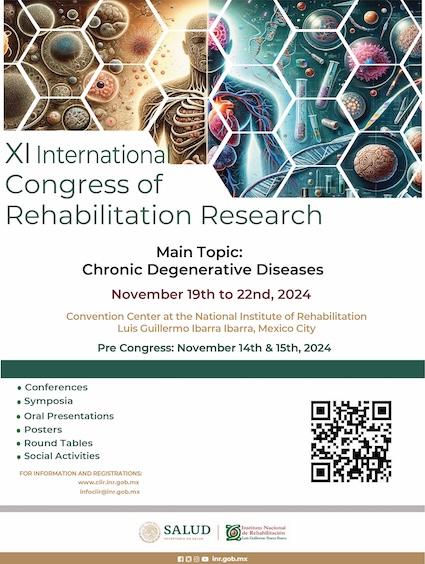Effect of neuropsychological rehabilitation in chronic stage of cerebral vascular disease in adolescents. Case study
DOI:
https://doi.org/10.35366/103940Keywords:
Cerebral vascular disease, neuropsychological rehabilitation, young, cognition, functionalityAbstract
Introducción: La enfermedad vascular cerebral (EVC) es rara en adolescentes; sin embargo, puede
tener consecuencias más importantes a esta edad debido a que muchas funciones cognitivas aún
están en desarrollo. Existen muy pocos reportes sobre el efecto de la rehabilitación neuropsicológica
(RN) en adolescentes con EVC en etapa crónica. Objetivo: Presentar los efectos de un programa de
RN en el estado cognitivo, emocional y funcional en un paciente de 19 años con secuelas crónicas
de EVC. Material y métodos: Se presenta el caso de un masculino de 19 años que sufrió un EVC
hemorrágico criptogénico en ganglios basales a los 16 años. Se realizó un programa de RN de 12
sesiones semanales de una hora de duración y evaluación antes y después de la intervención,
empleando tareas del Neuropsi breve, de la batería BANFE, así como tareas orientadas para la
exploración de habilidades espaciales y el inventario de depresión de Beck (BDI). Resultados: El
programa de RN generó efectos en el registro y evocación de la tarea de memoria verbal y cálculo del
Neuropsi breve; mejoró los tiempos de ejecución y aciertos en las tareas de la BANFE y logró mejor
desempeño en habilidades espaciales. Disminuyó la sintomatología depresiva y a nivel funcional, el
paciente logró retomar algunas actividades académicas en un contexto informal. Conclusión: La RN
resulta un recurso terapéutico capaz de mejorar el estado cognitivo y anímico en pacientes crónicos,
lo que puede facilitar la reincorporación de los pacientes a sus actividades cotidianas y académicas.
References
Hernández Pérez F. Evento Vascular en pacientes
jóvenes. Arch Med Urg Mex. 2011; 3 (2): 67-78.
Boot E, Ekker MS, Putaala J, Kittner S, De Leeuw FE,
Tuladhar AM. Ischaemic stroke in young adults: a global
perspective. J Neurol Neurosurg Psychiatry. 2020; 91
(4): 411-417. Available in: https://doi.org/10.1136/jnnp2019-322424
Malone LA, Felling RJ. Pediatric Stroke: unique
implications of the immature brain on injury and recovery.
Pediatr Neurol. 2020; 102: 3-9. Available in: https://doi.
org/10.1016/j.pediatrneurol.2019.06.016
O’Keeffe F, Liégeois F, Eve M, Ganesan V, King J,
Murphy T. Neuropsychological and neurobehavioral
outcome following childhood arterial ischemic stroke:
attention deficits, emotional dysregulation, and executive
dysfunction. Child Neuropsychol. 2014; 20 (5): 557-582.
Amorós-Aguilar L, Rodríguez-Quiroga E, SánchezSantolaya S, Coll-Andreu M. Effects of combined
interventions with aerobic physical exercise and cognitive
training on cognitive function in stroke patients: A
Systematic Review. Brain Sci. 2021; 11 (4): 473.
Nayak SD, Nair M, Radhakrishnan K, Sarma PS. Ischaemic
stroke in the young adult: clinical features, risk factors and
outcome. Natl Med J India. 1997; 10 (3): 107-112.
Putaala J. Ischemic Stroke in Young Adults. Continuum
(Minneap Minn). 2020; 26 (2): 386-414. Available in:
https://doi.org/10.1212/CON.0000000000000833
Laube C, van den Bos W, Fandakova Y. The relationship
between pubertal hormones and brain plasticity:
Implications for cognitive training in adolescence. Dev
Cogn Neurosci. 2020; 42: 100753.Available in: https://
doi.org/10.1016/j.dcn.2020.100753
Wilson B. Rehabilitation of memory. Nueva York: The
Guildford Press. 1987; 250pp.
Ismail FY, Fatemi A, Johnston MV. Cerebral plasticity:
Windows of opportunity in the developing brain. Eur J
Paediatr Neurol. 2017; 21 (1): 23-48. Available in: https://
doi.org/10.1016/j.ejpn.2016.07.007
Leisman G, Mualem R, Mughrabi SK. The neurological
development of the child with the educational enrichment
in mind. Psicología Educativa. 2015; 21 (2): 79-96.
Lo Coco D, Lopez G, Corrao S. Cognitive impairment
and stroke in elderly patients. Vasc Health Risk Manag.
; 12: 105-116.
Kernan WN, Ovbiagele B, Black HR, Bravata DM,
Chimowitz MI, Ezekowitz MD et al. Guidelines for the
prevention of stroke in patients with stroke and transient
ischemic attack: a guideline for healthcare professionals
from the American Heart Association/American Stroke
Association. Stroke. 2014; 45 (7): 2160-2236.
Zhao Q, Wang X, Wang T, Dmytriw AA, Zhang X,
Yang K et al. Cognitive rehabilitation interventions
after stroke: protocol for a systematic review and metaanalysis of randomized controlled trials. Syst Rev.
; 10 (1): 66. Available in: https://doi.org/10.1186/
s13643-021-01607-7
Downloads
Published
How to Cite
Issue
Section
License
Copyright (c) 2022 Instituto Nacional de Rehabilitación Luis Guillermo Ibarra Ibarra

This work is licensed under a Creative Commons Attribution 4.0 International License.
© Instituto Nacional de Rehabilitación Luis Guillermo Ibarra Ibarra under a Creative Commons Attribution 4.0 International (CC BY 4.0) license which allows to reproduce and modify the content if appropiate recognition to the original source is given.




